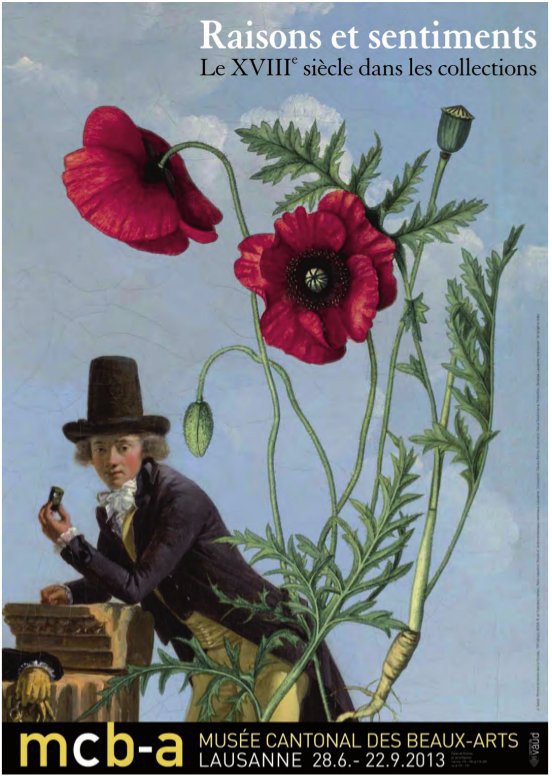Senses and Sensibilities
dal 26/6/2013 al 21/9/2013
Segnalato da
26/6/2013
Senses and Sensibilities
Musee cantonal des Beaux-Arts MCBA, Lausanne
The 18th Century in the Museum's Collections. The itinerary carries visitors along in that tempestuous current, taking them to the four corners of Europe Classicism, Rococo, Neoclassicism and Romanticism followed one another at breakneck speed, conveying the aspirations of a curious, inventive society.

curator Catherine Lepdor
The years that separate the death of Louis XIV in 1715 and the downfall of Charles
X in 1830 were crucial for France, a sounding board for Europe in the tense period
leading up to the Revolution in 1789, then digesting that major event.
It was the profile of our modern age that was being shaped in a society eager to
overturn the established power structure and replace it with democracy, to advance
the cause of knowledge, and probe the mysteries of the human soul. Everywhere
we see men and women at work conceiving and setting up great utopias that still
determine our horizons today.
Reason and Sentiment moves rapidly through this turbulent period. Artists, keeping
a balance between head and heart, participated in that search for a new world, and
in exploring and taming it. Classicism, Rococo, Neoclassicism and Romanticism
followed one another at breakneck speed, conveying the aspirations of a curious,
inventive society. The itinerary carries visitors along in that tempestuous current,
taking them to the four corners of Europe: the pomp of the Louis XIV period
portrait, nature sublimated or observed through a microscope, analysis of the
human soul, the invention of a new style of history painting, the triumph of genre
painting, courtly pastoral scenes, the depiction of the way of life of the common
people, and observation of architecture and antique sculpture, as well as of the
great masters of the Renaissance.
From room to room, a few modern and contemporary works placed alongside the
older collection show that the spirit of the 18th century is still alive today.
The exhibition draws mainly on the Museum’s own collections. It also benefits
from loans from private collections, as well as from public ones including the Neue
Pinakothek in Munich, the Marylebone Cricket Club Museum in London, the Natio-
nal Gallery of Scotland in Edinburgh, the Musée Calvet in Avignon, the Kunstmu-
seum in Bern, and the following museums in Lausanne: the Musée historique, the
Fondation de l’Hermitage, the Musée de l’Elysée, the Musée et Jardins botaniques
cantonaux, and the Musée cantonal de géologie.
To coincide with the exhibition we are publishing De la Renaissance au Romantisme.
Peintures françaises et anglaises du Musée des Beaux-Arts de Lausanne
Edited by Frédéric Elsig, 128 p., CHF 25.- (French).
Lausanne, Les cahiers du Musée cantonal des Beaux-Arts, 2013
Image: J. Sablet, Portrait de famille avec le Colisée (detail), 1791, Musée cantonal des
Beaux-Arts de Lausanne. R. de Constant, Herbier, Pavot coquelicot (detail),
Musée et Jardins botaniques cantonaux, Lausanne. Collage: Claudia Renna
Media contac:
Loïse Cuendet Tel. direct: +41 (0)21 3163448 loise.cuendet@vd.ch
Opening reception Thursday 27 June 2013 at 11 am
Musée cantonal des Beaux-Arts
Palais de Rumine, Place de la Riponne 6 CH - 1014 Lausanne
Opening hours:
Tuesday to Thursday: 11 am – 6 pm
Friday to Sunday: 11 am – 5 pm
Closed on Monday (16 September 2013, Jeûne Fédéral, as well)
1 August 2013: 11 am – 5 pm
Saturday 7 and Sunday 8 September 2013 Free
Admission
Adults: CHF 10.–
Pensioners, students, apprentices: CHF 8.–
Under 16: free
1st Saturday of the month: free



